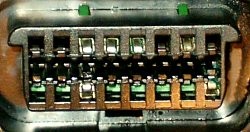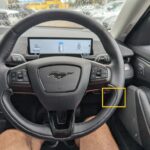Understanding whether your 2002 Jetta TDI is OBD2 scan compatible is crucial for modern vehicle diagnostics and maintenance. The On-Board Diagnostics II (OBD2) system became a standard for vehicles in many parts of the world, but compatibility depends on where your car was originally sold and regional regulations. Let’s delve into the specifics to clarify if your 2002 Jetta TDI is equipped for OBD2 scanning.
Decoding OBD-II Compatibility for European Vehicles
It’s important to understand that OBD-II compliance isn’t determined by where your Volkswagen Jetta TDI was manufactured, but rather by the regulations of the country where it was first sold. For vehicles sold new in the European Union, the timeline for OBD-II adoption is clearly defined by European directives.
For gasoline (petrol) vehicles in the European Union, full OBD-II compliance was mandated starting in 2002. This is based on Commission Directive 70/220/EEC, Annex I, which stipulated that:
8.1. Vehicles with positive-ignition engines With effect from 1 January 2000 for new types and from 1 January 2001 for all types, vehicles of category M1, except vehicles the maximum mass of which exceeds 2500 kg, and vehicles of category N1 class I, must be fitted with an on-board diagnostic (OBD) system for emission control in accordance with Annex XI. […]
This directive means that if your 2002 Jetta TDI was sold as new in a European Union country, it should be fully OBD-II compliant if it’s a petrol engine.
Now, what about diesel engines like your TDI? The regulations for diesel vehicles came slightly later. According to the same Commission Directive 70/220/EEC, Annex I:
8.2. Vehicles with compression-ignition engines Vehicles of category M1, except – vehicles designed to carry more than six occupants including the driver, – vehicles whose maximum mass exceeds 2500 kg, from 1 January 2003 for new types and from 1 January 2004 for all types, must be fitted with an on-board diagnostic (OBD) system for emission control in accordance with Annex XI.
While full OBD-II compliance for diesel vehicles in the EU was officially required from 2004 onwards, there was a period of “limited compliance” from 2004-2006. However, given the directive for petrol cars in 2002, it’s highly likely that a 2002 Jetta TDI sold in the European Union would also feature OBD-II capabilities, even if it might fall under “limited compliance” for diesel in those early years.
Verifying OBD-II Compatibility on Your 2002 Jetta TDI
While the directives strongly suggest OBD-II compatibility for your 2002 Jetta TDI if sold in the EU, there are practical ways to confirm this:
- Check the Vehicle Emission Control Information Label: Look under the hood of your Jetta TDI. You should find a label, often on the underside of the hood or in the engine bay, that explicitly states OBD-II compliance. This label (like the one in Fig. 1 of the original article) will often use terms like “OBD II,” “EOBD” (European OBD), or “JOBD” (Japanese OBD), all indicating OBD-II standards.
- Inspect the Diagnostic Link Connector (DLC): OBD-II compliant vehicles are equipped with a standardized 16-pin DLC connector. Locate this connector, usually found under the dashboard on the driver’s side. The shape and pin configuration should conform to the SAE J1962 standard (Fig. 3 from the original article). While a 16-pin connector is a good indicator, it’s not a guarantee, as some pre-OBD-II vehicles also used this type of connector, as highlighted with the Ford Escort example in Fig. 2.
-
Consult Your Vehicle’s Manual: Your 2002 Jetta TDI owner’s manual should provide information about OBD-II compliance. Look for sections on vehicle emissions or diagnostics.
-
Contact a Dealership: If you are still unsure, contacting a Volkswagen dealership can help. Provide them with your VIN (Vehicle Identification Number), and they should be able to confirm the original market specifications and OBD-II compliance.
Why OBD-II Compatibility Matters for Your 2002 Jetta TDI
OBD-II compatibility is essential because it allows you to use a wide range of diagnostic scan tools. These tools can read trouble codes from your car’s computer system, helping you diagnose issues like a check engine light, emissions problems, or sensor failures. For a 2002 Jetta TDI, being able to use an OBD-II scanner means you can perform DIY diagnostics, potentially saving on repair costs and gaining a better understanding of your vehicle’s health.
Conclusion: 2002 Jetta TDI and OBD2 Scanning
Based on European Union regulations for vehicles sold new in the EU, a 2002 Volkswagen Jetta TDI is very likely to be OBD-II scan compatible. The EU directives for petrol vehicles mandate OBD-II from 2001 onwards, and while diesel regulations officially started later, the practical implementation for a 2002 model year TDI sold in Europe points towards compatibility. To be absolutely certain, use the verification methods outlined above – check the emission control label, inspect the DLC connector, consult your manual, or check with a dealer. Having OBD-II on your 2002 Jetta TDI opens up a world of accessible and affordable vehicle diagnostics, empowering you to keep your car running smoothly.

